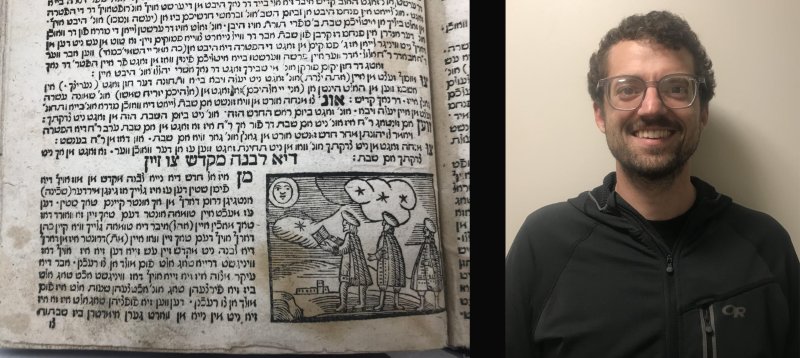WWU grad student Wilson Sackett researching Jewish prayer books in Germany
Sometimes, the journey your research takes you on leads you to uncover unexpected and hard-to-answer questions. Wilson Sackett, an English graduate student at WWU, discovered this when a research trip to Germany to study Jewish prayer books shifted and complicated his studies and opened new possibilities.
Last spring, Sackett was awarded Western’s Graduate Research and Creative Opportunities Grant to study Jewish prayer books in Germany. In particular, Sackett was interested in how Jewish prayer books in America differ from those in Europe. The year before, Sackett had investigated the effects and influence of Christian arguments about death and mourning on contemporary Jewish practices in America. He wanted to extend this research to investigate whether Jewish mourning practices and beliefs in Europe shared a similar Christian influence.
As part of his trip, Sackett spent three weeks in Frankfurt and Mainz, where he researched at Jewish libraries at Goethe University of Frankfurt and visited different places in the cities where prayer books were being used, such as the Westend Synagogue. Sackett chose to research in Frankfurt and Mainz because of the cities’ large and active Jewish populations.
During his trip, Sackett observed that while the prayer books in use were structured much like those in America, that “three to four individuals have constructed most of the ways Jewish people are practicing in that area.” This realization shifted Sackett’s research into a case study on those historical thinkers and the ways they have shaped the religious practice of Jewish people in Frankfurt.
Reflecting on how his research has changed over the summer, Sackett said, “This trip forced me into a conversation about translation and translation studies. Before the summer, that was not the case at all. I started looking into how prayers are being translated, the history of those translations, and why communities are using the translations they are using.”
While at first, Sackett was mainly interested in Jewish Ashkenazi mourning practices and traditions, by spending time with the prayer books in use in those communities, Sackett began paying close attention to the translation choices different versions were making. One Jewish theorist who was central in Sackett’s understanding of the importance of translation is Franz Rosenzweig. According to Sackett, Rosenzweig saw the prayerbook as “the central cultural text to any living Jewish community” and that the translation that a community uses is the “way in which a culture shares its own world with another.”
Sackett’s advisor for this project is WWU Associate Professor of English Jeremy Cushman. On working with Cushman, Sackett said, “He’s super supportive and he’s extremely knowledgeable as well. He has an openness to the topic, knowing that the topic is a fairly uncommon one. [Cushman is] helpful, understanding, encouraging—always thinking about how the project can push academic boundaries in some really helpful ways.”
Sackett also noted that the English Department as a whole has been supportive of his research, and he’s grateful for the faculty’s openness toward religious textual studies.
This fall, Sackett also received a Ross Travel Grant from Western to attend a Rhetoric and Religious Traditions conference at the University of Memphis, where he was part of a panel with Cushman on rhetoric practices and religion. Sackett presented a paper on the Shema prayer, which will be part of his thesis.
Currently, Sackett is working on his thesis project and making his own prayer book.
“I’m using my summer research to think about all the decisions that would go into my own prayer book, [including] curation, design, translation, essay writing, and publication,” he said.
Sackett said he plans for this prayer book to be used within Jewish communities while also serving as a rhetorical account of his translation choices, explaining how he arrived at his particular translations for the Hebrew prayers.
